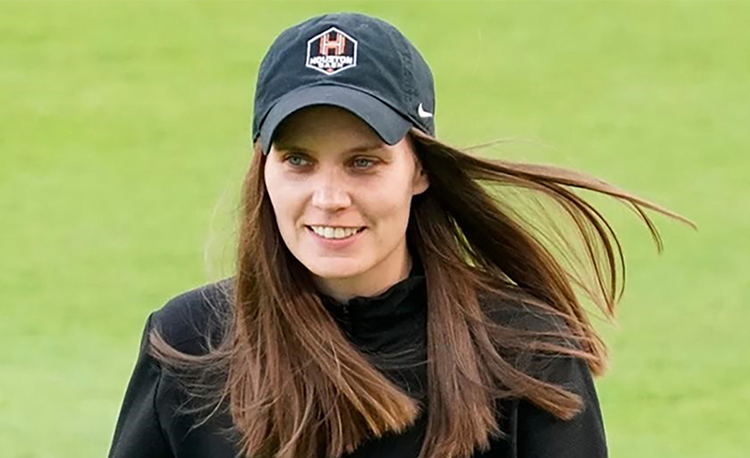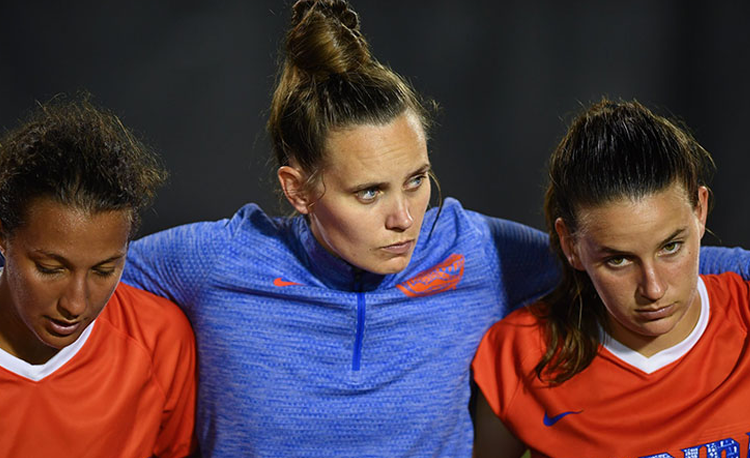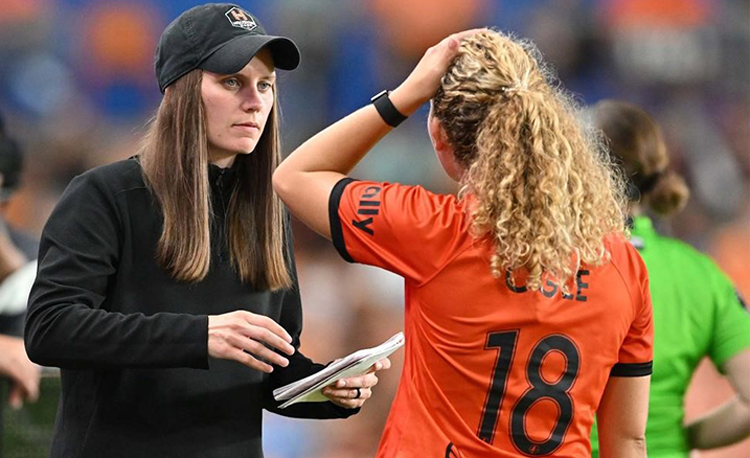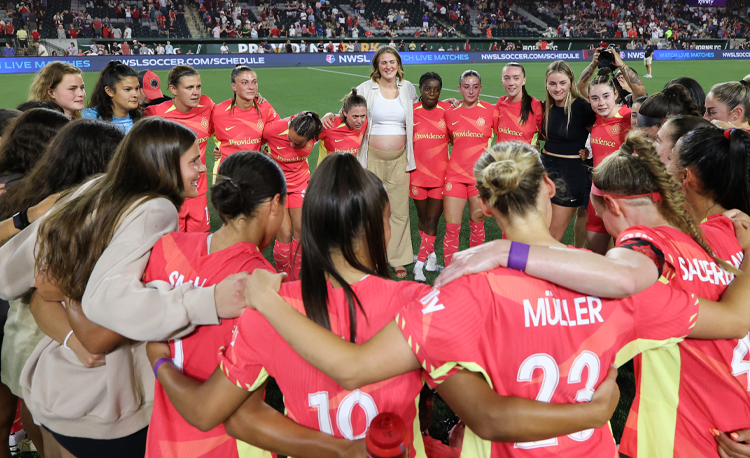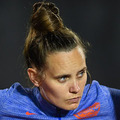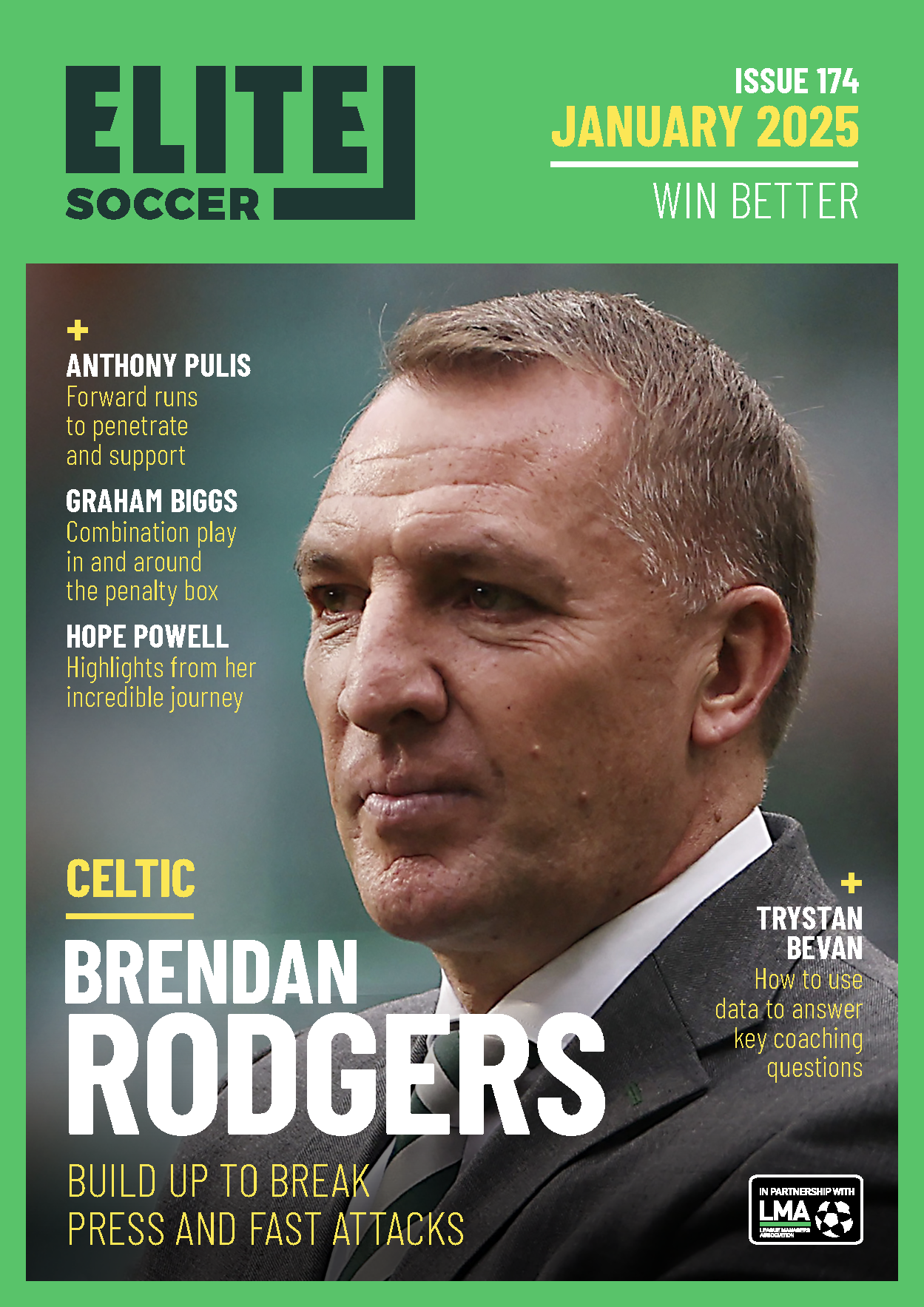You are viewing 1 of your 1 free articles
Sarah Lowdon: All she's learned
The youngest female to achieve the US Soccer Pro License, Sarah Lowdon’s journey from the Northeast of England to the top of the National Women’s Soccer League has been one of determination, courage and, at the heart of it all, a love of the game. She speaks to Elite Soccer about all she’s learned
Interview: Ben Bartlett, for the Elite Soccer Coaching Award
Words: Steph Fairbairn
There are few football stadiums that act as the focal point of a city in the way that St James’ Park does.
Known as ‘The Cathedral on the Hill’, SJP has been the home (or ‘yem’ as the locals would say) of Premier League club Newcastle United since 1892.
Originally opened in 1880, then a pitch on a patch of sloping grazing land, St James’ Park is now the eighth-largest club football stadium in England. These days, each matchday sees 50,000 fans traipse up the hill to watch the Black and White Army.
In this one-club, soccer-mad city, the locals have little choice but to be Newcastle United fans.
One such fan, who spent much of her childhood making her way up the hill, is current Portland Thorns assistant coach Sarah Lowdon.
Born across the river, in Gateshead, in 1989, Lowdon’s formative years aligned with a period of transformation for the Magpies. After a tough start to the 90s, in danger of dropping into the third tier of English soccer for the first time in the club’s history, the arrival of Kevin Keegan in the 1991-92 season saw things change.
By the time Lowdon was old enough to know what was going on, King Kev had the Magpies competing at the top end of the Premier League, with stars such as Peter Beardsley, Andy Cole, Rob Lee, Les Ferdinand, David Ginola, Tino Asprilla and, of course, Alan Shearer.
When Lowdon joined Ben Bartlett for a discussion as part of the Elite Soccer Coaching Award from her current home in Portland, Oregon – a city that may just rival Newcastle in its ardent support of its soccer team – she started by making reference to her beginnings in North East England.
“I was reared around the game of football,” she said.
“I was obsessed with Newcastle United. That’s how my love of the game started.”
By 14, Lowdon was playing for Newcastle United, helping the team achieve promotion from the Northern Combination League to what was then the FA Women’s Premier League Northern Division.
At the age of 18, Lowdon moved to Mississippi to start her collegiate career at Mississippi State University. She describes the move as “quite a culture shock”.
Time playing for McNeese State University in Lake Charles, Louisiana, followed, before Lowdon hung up her boots at 24 and made the move into coaching.
“I ended up in Texas with the first coaching gig that I had – in a place called Plainview. After that I was a volunteer with the Houston Dash, just picking up cones.
“Then I went to Florida as an equipment manager, working for Becky Burleigh, one of the best coaches in women’s collegiate football. I then spent a season at Penn State, then back to the Dash, then took on my current role of assistant coach at Portland Thorns.
“I wasn’t expecting to be in the pro realm, to be honest, but fell into it. The whole journey has been something that I didn’t expect, but I guess you can’t plan in this career.”
Related Files
Forging a path
Though she may not have exactly planned out her career thus far, Lowdon has been extremely intentional in the way she’s approached it.
At this point, she’s spent almost half her life in the USA building her craft (she makes reference to her ‘weird Geordie-American accent’) and has done so with a focus on three things: education, networking and experience.
Not only is Lowdon the youngest female, and seventh woman ever, to receive the US Soccer Pro License, she also has various other qualifications, including a bachelor’s degree in health and physical education, master’s degrees in sport management and exercise physiology and health promotion and certifications in strength and conditioning and athlete development.
For Lowdon, every bit of education only adds to her skill set as a coach.
“Everything is interlinked,” she said. “Everything is multifaceted.”
“One thing I’ve really tried to do in my career is give myself the best chance to be educated.
“With medical and high performance, they’re the experts. I’m by no means an expert in any of those fields, and your staff need autonomy, but I want a basic understanding of what’s happening.
“If I don’t have any base knowledge, how can I challenge what they’re saying? How can I even understand?
“It’s about pushing the boundaries because they might say, ‘Oh, this player doesn’t need a top-up,’ but I might say, ‘They didn’t hit their load in MD-1 and they had the day before off, so tell me more about that.’
“We’re all on the same team and we’re all trying to get to the same destination. We’re all trying to win and protect players as best we can but we also have to push, because at the end of the day we’re judged on wins and losses.”
Lowdon’s stance on networking is clear: “Networking should be a way of life.”
She explained: “We don’t do it enough as coaches because we’re too worried about not getting a response, so we don’t want to bother. I’m guilty of that.
“Networking shouldn’t be because you need something or want something. It should just be because it’s a natural interaction and you’re trying to learn from each other, and then maybe down the line that networking pays off because this person knows who you are.
“It’s all about who knows you. Timing and luck are important too, but the more people you can meet, the better it can be for you down the line.”
Lowdon took networking to the extreme when it comes to Becky Burleigh. Nothing sums up her level of intentionality better than the story of how she convinced Burleigh to take her under her wing.
“One of the biggest things for me as a young coach was to find someone who my core values aligned with,” she explained.
“I stumbled across some of Becky’s press conferences on YouTube.
“Because I didn’t have a great playing career, I was well aware of that, I knew that I had to do something different.
“I basically hounded Becky until she gave me a position. She essentially ignored me for the first two months.
“I knew I had to get in front of her. I ended up paying around $2,300, which at the time was so much money, it’s a college tuition, to go to an event where she was presenting.
“At the end of the day, I found her in the bar and I just said, ‘Can I buy you a drink?’
“From there, we created this plan over an eight-month period. We looked at opportunities in the cafeteria as a cafeteria worker, but I ended up going in as an equipment manager.
“Honestly, it was the best four years of my career, hands down. It shaped me as a person, shaped me as a coach, gave me the foundations.
“Obviously, now I’ve evolved completely. I’m a different coach and a different person from who I was then.”
Burleigh has gone on to be Lowdon’s biggest confidant in the game.
“Becky’s not just somebody who helped me get a position,” she said.
“She’s somebody that helps me stay in the position. That’s what’s been so important in my career. She’s my executive coach. She’s my thinking partner. She’s somebody I call every other day and talk through scenarios with.”
Riding the waves of the game
Lowdon has made sure to make the most of every opportunity that’s come her way – learning as much as she can, not rushing progression and, most importantly, being present in each moment. It’s an attitude which helps to keep her grounded in an industry which she very much understands the instability of.
“Stability is probably the most difficult piece of this job,” she said.
“You could be sacked at any minute and that’s just football. That’s how it works. In college, it’s a transformational environment where you help people beyond the realm of the sport, because they’re going to go on with a degree and do whatever they’re going to do.
“In the pro world, I used to think ‘transactional’ was a negative word – like I do this for you and you do this for me. To me now, ‘transactional’ is that you have to add to somebody’s livelihood, helping them in their career and adding value.
“If I can help Sophia Smith in any particular way, for example, it’s probably not going to be telling her how to finish. I think she thinks she’s got that mastered and I have no right to tell somebody how to finish a ball.
“But if I can impact her livelihood in a different way, help her in her career, that’s adding value to a player like that.”
In her time in the pro realm, Lowdon has been both an assistant coach and an interim head coach, taking the hotseat at Houston Dash twice, guiding the team the longest unbeaten streak in their history and, more recently, leading the Thorns out when head coach Rob Gale was struck with illness.
Speaking about her experience with the Dash, she said: “The biggest challenge is going from a head coach back to an assistant coach. Going from an assistant coach to a head coach is an easier transition.
“I didn’t think that at the time, but I think when you go back from the head coach to assistant coach, and you’ve had your own ideas and you’ve had success, that’s more of a challenge.
“The most important thing is that knowing your role is so important; staying in your lane and supporting when you need to support and leading when you need to lead.
“I do believe in a collaborative environment, but it must be with a decision-maker. There is collaboration around decision-making, but hierarchy when it comes to accountability.
“As an assistant coach, you have to be very good at reframing, and it’s a skill that is hard to learn.
“As an assistant coach, I deal with players that complain about playing time, and if I just listen and don’t say anything back to them, I can actually be undermining the head coach because I’m just not saying anything back.
“So I try to be creative: ‘Look, the head coach actually really believes in this player right now, and I believe you’re going to get your opportunity. When you do, the head coach is going to believe in you too.’
“You have to find a way to positively reframe it. It helps the individual, it helps the team, it helps the head coach, it helps the club. Being neutral is just as bad as being negative.
“The hardest thing that I have struggled with as a head coach is, and this is the secret that no one tells you: you’re going to have to manage players, but you have to manage staff.
“We had a situation where an assistant coach changed a set piece without telling the goalkeeping coach who was responsible right before the game. How do you manage that? No one prepares you.
“I was ready to fly off the handle, but if I have that energy, that assistant coach is going to match my energy and it’s not going to be good.”
Finding a coaching identity
Through the education, the networking, the experiences, Lowdon has carved out her identity as a coach, both in terms of values and playing style.
“You have to have your core values, there’s no doubt about it,” she said.
Her first? Accountability.
“I think it’s so important as a coach to have accountability. If you have accountability, you can have peer accountability, then you can have self-accountability through your group.
“The peer accountability is the most influential; as a coach, I’m not really around the players as much as they are around each other. Coaches can’t tell players what to do, and so you really have to try and influence through behaviour.
“You have to define what the behaviours are, you have to manage the good and the bad, and it’s so important to point out the good. As coaches, we’re so used to just pointing out the bad and you have to find ways to reinforce the good behaviours that you want to see. It comes down to modelling, as a coach, as a staff, and then players.”
Second? Courage.
“I don’t mind putting myself out there. I’m curious. I want to learn. I want to put myself in situations where I’m uncomfortable because I believe that you have to. I don’t have all the answers and I never will. The day I think I do, I probably shouldn’t be in the game.”
And Lowdon’s approach to playing style reflect this will to learn, be uncomfortable and adapt.
“When I was at Florida, it was a very positional-based style of play,” she explains. “For years, they had a lot of success with that.”
“Then towards the end of the time that I was there, I don’t think we had the key players that we needed in order to play that way, so that was an interesting experience.
“When I went to Penn State, it was a much more effective and efficient way of playing. It was very linked with the US women’s national team as our head coach worked with them at major tournaments.
“A top coach has to have a clear identity and a specific way of how they want to win with their ideas. That’s something I’ve started: first, I need to have a clear identity of who I am, and then I have to have a clear identity of how I want to play.
“It goes down to the vision, the people that you recruit, and the environment that you create. The reality is if you have better environments, you then create better players, and then you have a better team.
“Within six weeks of landing with the Dash, I ended up having to step in as the acting head coach, and talk about just trying to put out a fire - it was just like a fire hose. I felt like I was just getting sprayed in the face from all angles.
“You learn very quickly that you might have this team style of play that you want to implement, but you also have to realise where you’re at. I didn’t know how long I was going to be taking over for, and the key qualities of the players then become a factor.
“There’s club identity and then there’s coach identity. They both have to be related. I think about Jurgen Klopp at Liverpool; he fit the identity of the club.
“A club needs a coach with a project and the players need a coach with a philosophy.”
A vastly experienced coach, working over 4,000 miles away from home in one of the toughest leagues in the world at just 35, Lowdon’s ascent is without doubt down to her commitment to her craft, her perseverance, and her ability to roll with the punches that soccer delivers.
And it all began all those years ago - with the kid in love with the club in the Cathedral on the Hill.
Editor's Picks
Using the goalkeeper in build-up play
Pressing principles
Intensive boxes drill with goals
Penetrating the final third
Creating and finishing
My philosophy
Pressing initiation
Compact team movement
Defensive organisation
Coaches' Testimonials

Alan Pardew

Arsène Wenger

Brendan Rodgers

Carlos Carvalhal

José Mourinho

Jürgen Klopp

Pep Guardiola

Roy Hodgson

Sir Alex Ferguson

Steven Gerrard
Coaches' Testimonials

Gerald Kearney, Downtown Las Vegas Soccer Club

Paul Butler, Florida, USA

Rick Shields, Springboro, USA

Tony Green, Pierrefonds Titans, Quebec, Canada
Join the world's leading coaches and managers and discover for yourself one of the best kept secrets in coaching. No other training tool on the planet is written or read by the calibre of names you’ll find in Elite Soccer.
In a recent survey 92% of subscribers said Elite Soccer makes them more confident, 89% said it makes them a more effective coach and 91% said it makes them more inspired.
Get Monthly Inspiration
All the latest techniques and approaches
Since 2010 Elite Soccer has given subscribers exclusive insight into the training ground practices of the world’s best coaches. Published in partnership with the League Managers Association we have unparalleled access to the leading lights in the English leagues, as well as a host of international managers.
Elite Soccer exclusively features sessions written by the coaches themselves. There are no observed sessions and no sessions “in the style of”, just first-hand advice delivered direct to you from the coach.
